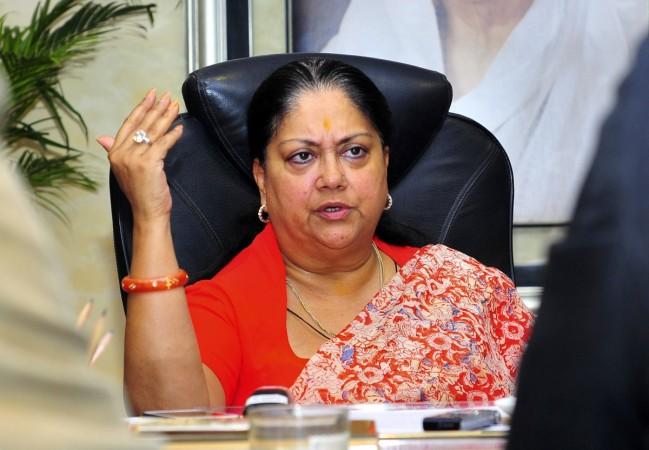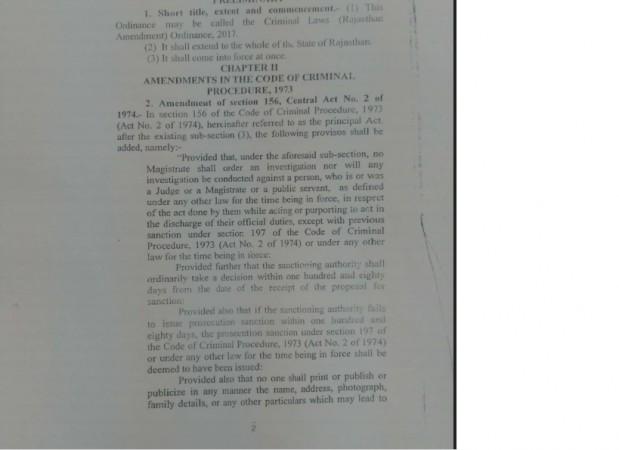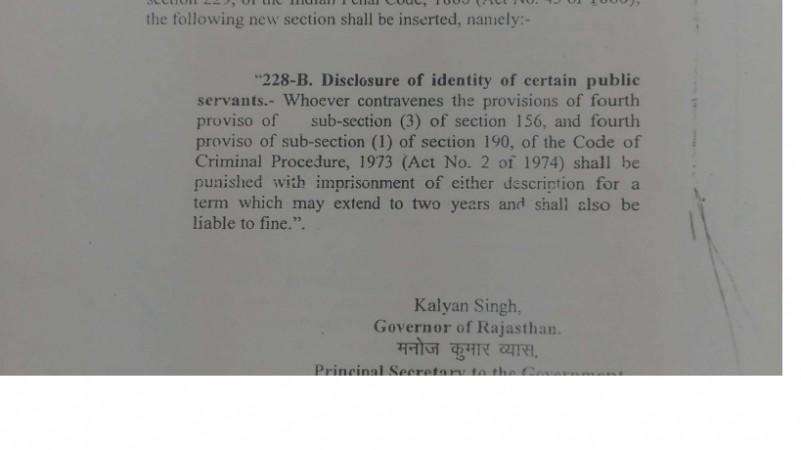
The controversial ordinance which was brought in by the Rajasthan Government earlier on September 7, apparently to protect public servants from allegations of corruption, has been tabled in the assembly on Monday, October 23, amidst the clamour against it and nationwide debate over its constitutional validity.
The Criminal Laws (Rajasthan Amendment) Ordinance, 2017 amended Section 156 and 190 of Code of Criminal Procedure Code (CrPC) and it stops a magistrate/judge from initiating an investigation against a judge, magistrate and a public servant except with the previous sanction from the government under S.197 Cr.PC.
The ordinance aimed at protecting all the public servants, magistrates and judges from any investigation also states, "No one shall print or publish or publicize in any manner the name, address, photograph, family details, or any other particulars which may lead to disclosure of identity of a Judge or Magistrate or a public servant against whom any proceedings under this section is pending, until the sanction as aforesaid has been or deemed to have been issued,..."
The ordinance also gives a time duration of 180 days (6 months) to the authorities for consideration of a sanction by the Rajastahan Government. In any case if there is a delay in providing the sanction, it has to be deemed as provided.
The ordinance has been strongly criticised by legal experts, lawmakers and they point out that it goes against the Supreme Court's statement which defended the freedom of press in its ruling.
Earlier in January 2017 SC has said, "No media content will be regulated unless a complaint has been registered against a broadcast or publication."
A lawyer from Rajasthan has filed a petition in the court saying the order grants " a large section of the society a license to commit crime".
Meanwhile in an appeal to the Raje Government, the Editors Guild of India said, "...Rather than taking stern measures to prevent and punish those who indulge in frivolous or false litigation, the Rajasthan government has passed an ordinance that is bent on bludgeoning the messenger."

Few of the statements in the petition filed against The Criminal Law Ordinance 2017, are as follows
The bill usurps judiciary's powers. It takes away the power of a magistrate to direct police to register an FIR and probe a complaint, violating the basic structure of the Constitution.
The arbitrary protection against investigation violates Articles 14 (right to equality) and 21 (right to life) of the Constitution.
It subverts independent investigation of erring bureaucrats and strikes at the core of rule of law and the principles of independent, unhampered, unbiased and efficient investigation.
Also according to the newly imposed ordinance, anybody found violating the listed instructions, will be imprisoned for two years.

Meanwhile Congress leader, Sachin Pilot who led a protest against the ordinance in Rajasthan assembly, has said, "We will not allow this law to come into force under any circumstance. This is their plan to cover up their own corruption."
Taking a jibe at Vasundhara Raje, the Congress Vice President also tweeted, "Madam Chief Minister, with all humility we are in the 21'st century. It's 2017, not 1817."
Rajasthan Government's Defence
The reason given by the Raje Government to defend the ordinance is that the following ordinance has been implemented to ensure protection of all the officials and public servants, from false cases and harassment.
Although in its defence the Raje government has said that the ordinance or its regulations do not bother the zero-tolerance stance against corruption.
Further clarifying over the ordinance, Home Minister Gulab Chand Kataria said, "It was brought to check false cases against officials."
In another justification by the government for imposing such a law, it says that in past three years, the Anti-Corruption Bureau has filed over 1100 cases against Rajasthan officials including few IAS officials.
The very numbers reveal that corruption is on the rise in the state and now the the government is apparently bent upon shielding the people facing allegations of corruption, rather than putting in stringent measures to check corruption and to expedite investigation into the allegations.
Instead of giving priority to the common citizen and stressing on transparency, the Rajasthan government has gone all the way out to protect the interests of the public servants and to insulate them from corruption charges.

















